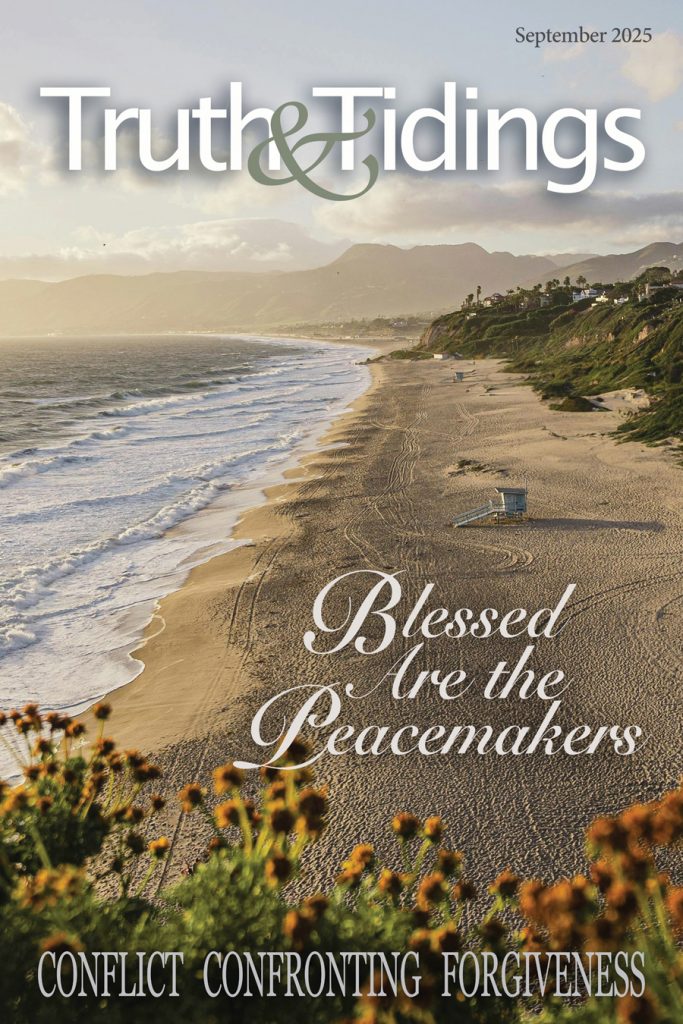Εngraved on both a set of granite steps and a wall at the United Nations headquarters in New York are the words of Isaiah 2:4: “They shall beat their swords into plowshares, and their spears into pruning hooks; nation shall not lift up sword against nation. Neither shall they learn war any more.” The words depict the UN’s charter objective to remove threats to peace in order to maintain international peace and security. The UN, however, is not the fulfillment of Isaiah 2, nor has any man-made organization been able to produce global disarmament or maintain international peace. But our hope doesn’t rest in the governments of this age. Isaiah’s prophecy will be fulfilled in the coming reign of the Lord Jesus Christ.
The Lord of Peace
Tension and turmoil were never the Creator’s intention for the world, and He cannot leave it to sinful men and their devilish, oppressive methods forever. “The God of peace will soon crush Satan under your feet” (Rom 16:20).1 And as the character of God demands a restoration of peace in His creation, the one Man who is able to establish and uphold the peace that was lost is the Man of equal character. That is His Son, Jesus Christ, upon whom He bestows the lovely titles, “Prince of Peace” (Isa 9:6) and “Lord of Peace” (2Th 3:16). The character of the Man on the throne in that day will characterize the kingdom over which He rules.
When the Lord Jesus entered Jerusalem on a donkey, Matthew aptly cited Zechariah 9:9 (“your King is coming to you,” Mat 21:5). The King was rejected and given a violent death. But the following verse in Zechariah’s prophecy looks ahead to the peace of the triumphant Christ’s millennial kingdom: “The bow of war will be removed, and he will proclaim peace to the nations. His dominion will extend from sea to sea, from the Euphrates River to the ends of the earth” (Zec 9:10). The kingdom will be marked by great prosperity which, along with the refashioning of weapons into agricultural tools, will contribute to peaceful relations among men. But the key component for the world to finally experience peace will be the character of the Man who governs it.
Righteousness Produces Peace
Because of man’s inherent sinfulness, we have been unable to govern with true, consistent righteousness. We lack the wisdom to perceive the evil at work or the courage to condemn it. We feel the pressure from those who lobby for the outcome that benefits them. We sell out to those who will later line our pockets. We take advantage of the weak and oppressed because we know they cannot fight back. We think might is right, or else we compromise on what is right in order to maintain a pseudo and short-lived peace that is as fragile as it is fake. But won’t it be wonderful, beloved, when our Man is reigning over the earth?
The Lord Jesus is not swayed by the sinful whims of others and He has no sin within Himself. He will get to the heart of the issues. “He will not judge by what he sees with his eyes, he will not execute justice by what he hears with his ears, but he will judge the poor righteously and execute justice for the oppressed of the land. He will strike the land with a scepter from his mouth, and he will kill the wicked with a command from his lips. Righteousness will be a belt around his hips; faithfulness will be a belt around his waist” (Isa 11:3-5). And listen to what follows: “The result of righteousness will be peace; the effect of righteousness will be quiet confidence forever. Then my people will dwell in a peaceful place, in safe and secure dwellings” (32:17-18). The peace of the kingdom will be a consequence of the righteousness of the King. This is also intimated by “Melchizedek, king of Salem, priest of God Most High” (Heb 7:1; cf. Gen 14) – a lovely picture of Christ. “First, his name means king of righteousness, then also, king of Salem, meaning king of peace” (Heb 7:2). Notice righteousness first, then peace.2
Carefully note the features above that characterize His rule and that lead to peace: impartiality, special attention to the oppressed, the removal of the wicked, and righteousness. He doesn’t play favorites but instead judges cases upon facts. To the hypocritical religious leaders of His day, the Lord said, “Stop judging according to outward appearances; rather judge according to righteous judgment” (Joh 7:24). Yet His concern for the facts does not imply a cold indifference to people; He recognizes that some individuals’ lot in life often leaves them unjustly disadvantaged, and He corrects that. Wicked people will not be allowed to roam freely in search of more victims. Not only does the Lord see their actions, but He knows their hearts, and justice will be served. And overarching all of this is an understanding of what really is right and what really is wrong. The Psalmist said, “The decrees you issue are righteous and altogether trustworthy” (Psa 119:138), and the Lord Jesus perfectly understands and applies all the decrees of God. While it is true that our governments need to learn this, so do we as the people of God today. Local churches should also be characterized by a Christ-like love of righteousness and hatred of wickedness (Psa 45:7).
Justice is coming, beloved. Righteousness will reign. A corrupt and broken world will yet be rescued and repaired. “Let justice flow like water, and righteousness, like an unfailing stream” (Amo 5:24). “Amen! Come, Lord Jesus!” (Rev 22:20).
1 Bible quotations in this article are from the CSB.
2 See Romans 14:17, where righteousness and peace are both linked with the kingdom and our life today.

